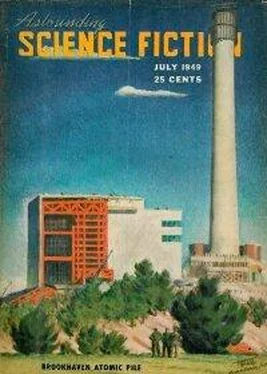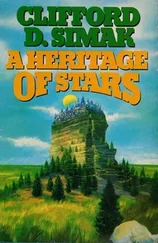Clifford Simak - Eternity Lost
Здесь есть возможность читать онлайн «Clifford Simak - Eternity Lost» весь текст электронной книги совершенно бесплатно (целиком полную версию без сокращений). В некоторых случаях можно слушать аудио, скачать через торрент в формате fb2 и присутствует краткое содержание. Год выпуска: 1949, Издательство: Street & Smith Publications, Inc., Жанр: Фантастика и фэнтези, на английском языке. Описание произведения, (предисловие) а так же отзывы посетителей доступны на портале библиотеки ЛибКат.
- Название:Eternity Lost
- Автор:
- Издательство:Street & Smith Publications, Inc.
- Жанр:
- Год:1949
- ISBN:нет данных
- Рейтинг книги:5 / 5. Голосов: 1
-
Избранное:Добавить в избранное
- Отзывы:
-
Ваша оценка:
- 100
- 1
- 2
- 3
- 4
- 5
Eternity Lost: краткое содержание, описание и аннотация
Предлагаем к чтению аннотацию, описание, краткое содержание или предисловие (зависит от того, что написал сам автор книги «Eternity Lost»). Если вы не нашли необходимую информацию о книге — напишите в комментариях, мы постараемся отыскать её.
Eternity Lost — читать онлайн бесплатно полную книгу (весь текст) целиком
Ниже представлен текст книги, разбитый по страницам. Система сохранения места последней прочитанной страницы, позволяет с удобством читать онлайн бесплатно книгу «Eternity Lost», без необходимости каждый раз заново искать на чём Вы остановились. Поставьте закладку, и сможете в любой момент перейти на страницу, на которой закончили чтение.
Интервал:
Закладка:
Chairman Leonard:But there are benefits—
Dr. Barton:Benefits, yes. The benefit of allowing a scientist the extra years he needs to complete a piece of research; a composer an additional lifetime to complete a symphony. Once the novelty wore off, men in general would accept added life only under protest, only as a duty.
Chairman Leonard:You’re not very practical-minded, doctor.
Dr. Barton:But I am. Extremely practical and down to earth. Man must have newness. Man cannot be bored and live. How much do you think there would be left to look for-ward to after the millionth woman, the billionth piece of pumpkin pie?
From the Records of the hearing before the science subcommittee of the public policy committee of the World House of Representatives.So Norton hated him.
As all people of normal lives must hate, deep within their souls, the lucky ones whose lives went on and on.
A hatred deep and buried, most of the time buried. But sometimes breaking out, as it had broken out of Norton.
Resentment, tolerated because of the gently, skillfully fos-tered hope that those whose lives went on might some day make it possible that the lives of all, barring violence or accident or incurable disease, might go on as long as one would wish.
I can understand it now, thought the senator, for I am one of them. I am one of those whose lives will not continue to go on, and I have even fewer years than the most of them.
He stood before the window in the deepening dusk and saw the lights come out and the day die above the unbelievably blue waters of the far-famed lake.
Beauty came to him as he stood there watching, beauty that had gone unnoticed through all the later years. A beauty and a softness and a feeling of being one with the city lights and the last faint gleam of day above the darkening waters.
Fear? The senator admitted it.
Bitterness? Of course.
Yet, despite the fear and bitterness, the window held him with the scene it framed.
Earth and sky and water, he thought. I am one with them. Death has made me one with them. For death brings one back to the elementals, to the soil and trees, to the clouds and sky and the sun dying in the welter of its blood in the crimson west.
This is the price we pay, he thought, that the race must pay, for its life eternal—that we may not be able to assess in their true value the things that should be dearest to us; for a thing that has no ending, a thing that goes on forever, must have decreas-ing value.
Rationalization, he accused himself. Of course, you’re rationalizing. You want another hundred years as badly as you ever did. You want a chance at immortality. But you can’t have it and you trade eternal life for a sunset seen across a lake and it is well you can. It is a blessing that you can.
The senator made a rasping sound within his throat.
Behind him the telephone came to sudden life and he swung around. It chirred at him again. Feet pattered down the hall and the senator called out: “I’ll get it, Otto.”
He lifted the receiver. “New York calling,” said the operator. “Senator Leonard, please.”
“This is Leonard.”
Another voice broke in. “Senator, this is Gibbs.”
“Yes,” said the senator. “The executioner.”
“I called you,” said Gibbs, “to talk about the election.”
“What election?”
“The one here in North America. The one you’re running in. Remember?”
“I am an old man,” said the senator, “and I’m about to die. I’m not interested in elections.”
Gibbs practically chattered. “But you have to be. What’s the matter with you, senator? You have to do something. Make some speeches, make a statement, come home and stump the country. The party can’t do it all alone. You have to do some of it yourself.”
“I will do something,” declared the senator. “Yes, I think that finally I’ll do something.”
He hung up and walked to the writing desk, snapped on the light. He got paper out of a drawer and took a pen out of his pocket.
The telephone went insane and he paid it no attention. It rang on and on and finally Otto came and answered.
“New York calling, sir,” he said.
The senator shook his head and he heard Otto talking softly and the phone did not ring again.
The senator wrote:
To Whom It May Concern:
Then crossed it out.
He wrote:
A Statement to the World:
And crossed it out.
He wrote:
A Statement by Senator Homer Leonard:
He crossed that out, too.
He wrote:
Five centuries ago the people of the world gave into the hands of a few trusted men and women the gift of continued life in the hope and belief that they would work to advance the day when longer life spans might be made possible for the entire population.
From time to time, life continuation has been granted additional men and women, always with the implied understanding that the gift was made under the same conditions — that the persons so favored should work against the day when each inhabitant of the entire world might enter upon a heritage of near-eternity.
Through the years some of us have carried that trust forward and have lived with it and cherished it and bent every effort toward its fulfillment.
Some of us have not.
Upon due consideration and searching examination of my own status in this regard, I have at length decided that I no longer can accept farther extension of the gift.
Human dignity requires that I be able to meet my fellow man upon the street or in the byways of the world without flinching from him. This I could not do should I continue to accept a gift to which I have no claim and which is denied to other men.
The senator signed his name, neatly, carefully, without the usual flourish.
“There,” he said, speaking aloud in the silence of the night-filled room, “that will hold them for a while.”
Feet padded and he turned around.
“It’s long past your usual bedtime, sir,” said Otto.
The senator rose clumsily and his aching bones protested. Old, he thought. Growing old again. And it would be so easy to start over, to regain his youth and live another lifetime. Just the nod of some-one’s head, just a single pen stroke and he would be young again.
“This statement, Otto,” he said. “Please give it to the press.”
“Yes, sir,” said Otto. He took the paper, held it gingerly.
“Tonight,” said the senator.
“Tonight, sir? It is rather late.”
“Nevertheless, I want to issue it tonight.”
“It must be important, sir.”
“It’s my resignation,” said the senator.
“Your resignation! From the senate, sir!”
“No,” said the senator. “From life.”
Mr. Michaelson:As a churchman, I cannot think otherwise than that the proposal now before you gentlemen constitutes a perversion of God’s law. It is not within the province of man to say a man may live beyond his allotted time.
Chairman Leonard:I might ask you this: How is one to know when a man’s allotted time has come to an end? Medicine has prolonged the lives of many persons. Would you call a physician a perverter of God’s law?
Mr. Michaelson:It has become apparent through the testimony given here that the eventual aim of continuing research is immortality. Surely you can see that physical immortality does not square with the Christian concept. I tell you this, sir: You can’t fool God and get away with it.
From the Records of a hearing before the science subcommittee of the public policy committee of the World House of Representatives.Chess is a game of logic.
Читать дальшеИнтервал:
Закладка:
Похожие книги на «Eternity Lost»
Представляем Вашему вниманию похожие книги на «Eternity Lost» списком для выбора. Мы отобрали схожую по названию и смыслу литературу в надежде предоставить читателям больше вариантов отыскать новые, интересные, ещё непрочитанные произведения.
Обсуждение, отзывы о книге «Eternity Lost» и просто собственные мнения читателей. Оставьте ваши комментарии, напишите, что Вы думаете о произведении, его смысле или главных героях. Укажите что конкретно понравилось, а что нет, и почему Вы так считаете.











